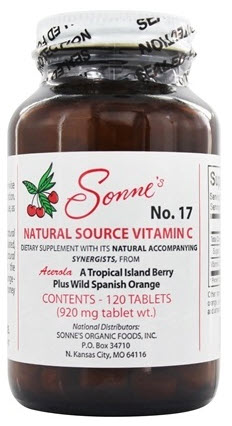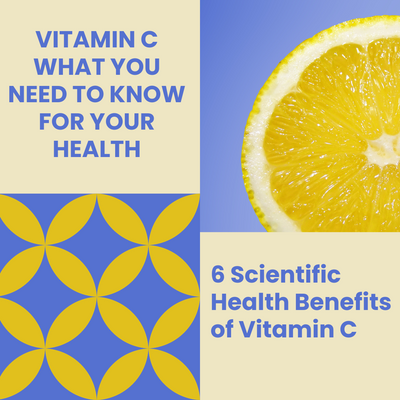Vitamin C: What You Need to Know for Your Health
Oct 5th 2023

Vitamin C is an important supplement - especially in the winter. Making sure you and your family have enough Vitamin C daily is important for health. And, here's why.
6 Scientific Health Benefits of Vitamin C
1. Vitamin C Leads to Better Absorption of other Vitamins and Minerals
It's essential to know that some supplements are important to make sure you get the correct portions to help with the interaction of other vitamins and minerals. Yes, Vitamin C is a daily supplement and anything extra goes into your body's waste cycle.
2. Vitamin C Stimulates Collagen Synthesis (Younger Looking Skin)
Overview from the Oregon State University Vitamin C and Skin Health Study: The antioxidant properties of vitamin C (ascorbic acid) and its role in collagen synthesis make vitamin C a vital molecule for skin health. Dietary and topical ascorbic acid have beneficial effects on skin cells, and some studies have shown that vitamin C may help prevent and treat ultraviolet (UV)-induced photodamage. However, the effects of vitamin C in the skin are not well understood due to limited research. This article discusses the potential roles of vitamin C in the skin and summarizes the current knowledge about vitamin C in skin health.
3. Vitamin C Antioxidant Properties Help Guard Against Chronic Disease
Many of the benefits of vitamin C can be traced to its antioxidant properties. “Antioxidants act to neutralize free radicals, which are volatile and harmful substances produced in the body that cause damage to cells and tissues,” Samuels says. According to the Mayo Clinic, antioxidants can protect against the development of serious health conditions, such as cancer or heart disease.
More studies — especially ones involving human participants — are needed, however, to show whether vitamin C specifically can prevent cancer or cardiovascular disease, per Harvard T.H. Chan School of Public Health.
4. Vitamin C Plays a Role in Enhanced Brain Functions
Neurotransmitters are important for sending messages from the brain to the rest of the body, according to the University of Queensland, in Australia. And more vitamin C may be associated with increased brain function. A systematic review published in September 2017 in Nutrients found higher vitamin C concentrations in cognitively intact study participants compared with those with impaired cognition.
5. Vitamin C's Natural Antioxidant Rich Nature Helps Protect the Eyes
The American Optometric Association notes that vitamin C can lower the risk of developing cataracts and can also help slow the progression of age-related macular degeneration (AMD). Specifically, previous research has found taking 500 mg per day as part of a daily supplement slowed the progression of the disease among people with moderate AMD, likely because of its antioxidant properties.
6. Vitamin C Strengthens the Immune System
Perhaps Vitamin C's most commonly known attribute is its contribution to the immune system.
In a review published in November 2017 in Nutrients, vitamin C was found to support the immune system by protecting against oxidative stress, aiding in microbial killing, and decreasing the potential for tissue damage. A deficiency in this vitamin has been shown to increase the rate of infections. It’s unlikely that loading up on vitamin C once you start sniffling will keep you from getting a cold, but it could help you recover more quickly, according to an NIH study review.
About Sonne #17 Natural Source Vitamin C

Sonne's #17 Natural Source Vitamin C tablets contain natural vitamin C derived from dehydrated juice of the Acerola and Amla berries. These food sources provides the vitamin C complex (i.e., bioflavonoids and other synergistic nutrients), factors not present in supplements that use synthetic ascorbic acid (chemical form of vitamin C). Our Natural Source Vitamin C has a 100 mg equivalent of ascorbic acid per serving, supplying 111% of the recommended Daily Value (%DV). However, the natural synergy of the vitamin C complex and bioflavonoids provides much more powerful antioxidant activity than synthetic vitamin C (ascorbic acid) does alone.*
Vitamin C plays an essential role in the formation of collagen, the connective tissue that is required for normal maintenance, growth, repair, and healing of living tissues. Vitamin C also functions as an antioxidant, and protects other antioxidants such as seleno proteins, glutathione, and vitamin E from becoming oxidized (inactivated) in the body.* Since vitamin C is constantly being utilized, it should be taken in small repeated doses throughout the day. Our chewable tablets are ideal for this purpose, providing easy and rapid absorption of the natural vitamin C complex.
Because the acerola berry is naturally sour and bitter, we add powdered molasses and honey for a tart but pleasant taste. The Acerola berry (officially called a berry) is a red cherry-like tropical fruit grown on berry-like bushes. It is considered one of the best and most potent sources of natural vitamin C, with more ascorbic acid per ounce of juice than most fruits. The amla berry is another very potent, natural source of the vitamin C complex. These tablets are made from fruit sources in their natural state, with all their natural accompanying synergists.
Many eminent nutritionists, physicians, and scientists (including the late Linus Pauling) recommend that large amounts of vitamin C be added to the ordinary diet. Vitamin C can help prevent infection. (The U.S. Department of Agriculture has called vitamin C an "anti-infection vitamin.")* Vitamin C is also a powerful antioxidant that can protect cells from damage by free radicals. In the absence of sufficient vitamin C, blood capillaries become fragile and are prone to rupture. The U.S. Recommended Daily Value for adult males is 90 mg, but much higher amounts may be desirable. Vitamin C is water-soluble so all excess vitamin C is excreted in the urine. It is interesting to note that many people experience burning when they urinate after taking large doses (1g or more) of ascorbic acid. We´ve had no such experiences with our natural product.
Ascorbic acid is not as effective
In a 1952 issue of Nature, an article reported an experiment concerning a disease involving fragility of blood vessel walls. The researchers treated one group of laboratory animals with green peppers (known for its high content of vitamin C), and the second group with ascorbic acid (synthetic vitamin C). The disease was cured only by the green peppers and not by the ascorbic acid.
Synthetic vitamins have certain definite therapeutic values in severe cases under a doctor´s supervision, but in our humble opinion, they should not be considered a food for continued daily consumption.
Recommended Dosage: 1 tablet daily, or as many as desired for dietary supplementation
Directions: Chew tablets or allow them to dissolve on the tongue, as preferred.
Contents: 120 tablets (100 mg of vitamin C - 111% of the Daily Value)
Ingredients: Acerola berry, amla berry, powdered honey, molasses, and arrowroot. Contains milk.
To purchase Sonne Supplements #17 Natural Source Vitamin C, link here.
As with adding any change to your diet, check with your medical professional team to check for potential health benefits and possible risks of adding a new supplement. Vitamin C in large doses is counter indicated with some medications.

